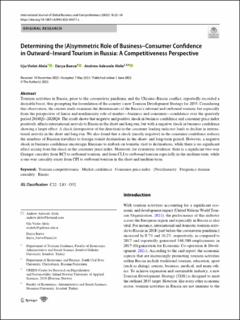Determining the (a)symmetric role of business-consumer confidence in outward-inward tourism in Russia: a competitiveness perspective
Peer reviewed, Journal article
Published version
Permanent lenke
https://hdl.handle.net/11250/3127009Utgivelsesdato
2023Metadata
Vis full innførselSamlinger
Originalversjon
International Journal of Global Business and Competitiveness (IJGBC). 2023, 18 22-34. 10.1007/s42943-023-00077-zSammendrag
Tourism activities in Russia, prior to the coronavirus pandemic and the Ukraine–Russia conflict, reportedly recorded a desirable boost, thus prompting the formulation of the country’s new Tourism Development Strategy for 2035. Considering this observation, the current study examines the determinants of the Russia’s inbound and outbound tourism, but especially from the perspective of linear and nonlinearity role of market—business and consumer—confidence over the quarterly period 2010Q1–2020Q4. The result shows that negative and positive shock in business confidence and consumer price index positively affects international arrivals to Russia in the short and long run, but with a negative shock in business confidence showing a larger effect. A shock (irrespective of the direction) in the consumer leading indicator leads to decline in international arrivals in the short and long run. We also found that a shock (mostly negative) in the consumer confidence reduces the numbers of Russian travellers to foreign tourist destinations in the short- and long-term period. However, a negative shock in business confidence encourages Russians to embark on touristic visit to destinations, while there is no significant effect arising from the shock in the consumer price index. Moreover, for symmetric evidence, there is a significant two-way Granger causality from BCI to outbound tourism, and from CLI to outbound tourism especially in the medium term, while a one-way causality exists from CPI to outbound tourism in the short and medium term.

